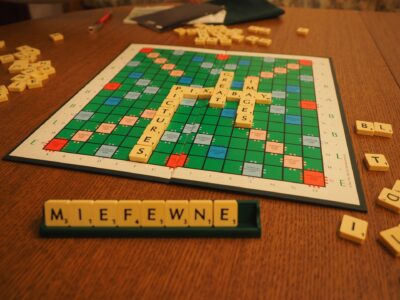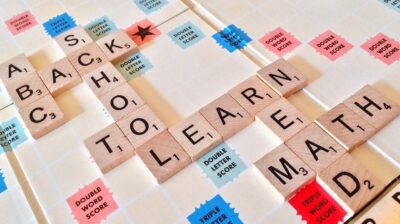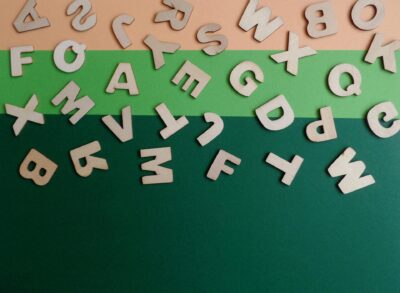
An Interview with Scrabble Champion Craig Beevers
Craig Beevers is a big name in the Scrabble world. He’s won thousands of games over the course of his Scrabbling career as well as dozens of tournaments, among them the World Scrabble Championships of 2014, which made Beevers the best in the world at the game. Now, Beevers – who has now semi-retired from the game – sits down with us to talk about his career, his best tips for amateur players, and what he loves about Scrabble.
This interview has been edited for length.
So, let’s start with the basics: how and when did you get into Scrabble?
A very long time ago! Basically, it started off when I was playing on a Spectrum 48k computer, and we had the game Scrabble on that. I was four or five at the time, and my parents, they’d get me to put words in the computer, so that’s kind of the first time I ever saw it. We did play it occasionally when we’d go on camping trips and that sort of thing, we’d play it on the board, but it was more me against the computer or playing on different versions. Then I really got into it when I was at university, around the year 2000 when the internet was sort of coming on and it was all dial-up modems and that kind of thing. The university had really good internet, and I started playing a game called Yahoo Literati, a few things on Yahoo, and I got into Scrabble from there, basically. That was when I really got into it, my competitive side.
You’ve obviously had a very accomplished Scrabble career. What do you consider to be your career highlights?
I’m one of those people that are very, very, very competitive, which is partly why I ended up playing against the computer [as a kid], because I’d beat my sister or my parents or whatever, so nobody would play me. So I always had an aim, if I’m going to get into something, I would have always gotten into some sort of game, and it just happened to be Scrabble. I was aiming to be World Champion, and the world championship, that was five days of Scrabble to win, so that was definitely the highlight, since that’s the one I was aiming for, and obviously everyone can recognize it. It wasn’t some sort of random Newcastle tournament or local thing that nobody understands. It’s something that transcends to everyone. Anyone can understand if you’re the world champion at anything, it’s a pretty big deal.

Why do you think you’re so good at Scrabble?
Scrabble is very mathematical, contrary to what people probably think. The unscrambling of words is a very mathematical process. Once you get to the very high level, it’s all about what you score now and what you leave on your rack for the next turn. Sometimes you gotta sacrifice a few points now to get more in the future. Also, you got things like how well do the letters combine, and how many letters are there to come, and whether there’s a lot of vowels left, a lot of consonants left, if there’s a Q to come, if I can avoid getting the Q or can I insure against it. If I get the Q do I keep the U behind or an I or whatever? So it’s all those kinds of things, and it becomes very mathematical because it’s a lot of little factors. Things like knowing the words – my first world championship ever was won by I think a Thai player, who couldn’t speak much English at all. So anybody can put the work in and learn the words, but you’ve got to be able to find them in the game. And I have a mathematical background, I did study maths at university and that kind of thing.
[Other than that], you’ve got to have a good memory to remember all the words, and you’ve got to have a good temperament as well because you can be the best player or one of the best players, and you’re gonna have runs of bad games where you just lose three games in a row, and you’ve done absolutely nothing wrong, you just lose because you’ve had bad luck. [You’ve got to] be able to keep your head for that next game that you might win by a handful of points, and vice versa, you can win three games in a row and then have a marginal one where you have to play it properly to win. And sort of not getting too big-headed or being too overconfident with things. So there’s a lot of temperament involved, I’d say.
You also had a very successful run on the British game show Countdown, winning series 57. Do you think that used similar skills to Scrabble?
Countdown’s a little bit different because Countdown has word rounds, but you also have the number games which are more obviously maths. Countdown’s a lot simpler than Scrabble because you’re not having to fit words, you just have to find them, basically. So the main challenge for me for Countdown is that the dictionaries are so different, so I could find lots of sort of obscure Scrabble words, but most of them wouldn’t be allowed. It was almost like trying to hold myself back a lot of the time, and not going for obscure words that probably weren’t going to be good. Also, when you’re playing in the sort of finals, it comes down to two or three rounds in the match, and [if] you make one or two mistakes, that’ll be it, or you could lose out on the countdown, where it’s basically first to hit the buzzer and get it right can decide the game. Fortunately with me, it didn’t go down to that, so it’s very difficult but also simpler as well.
You obviously play tournament Scrabble, but many of our readers are probably more casual players. For them, and other people who might not be aware, what do you consider the biggest difference between casual and tournament Scrabble?
There’s so many things. For those who don’t realize how much skill is involved – I mean, obviously, in Scrabble, you can get unlucky, you can draw three ‘I’s out of the bag, you can draw all vowels, all consonants, that sort of thing. But actually, there’s a lot of intrinsic skill to the game. Somebody like me, who put all those hours in, 10,000+ hours studying the words and that kind of thing, the difference between me and the average player is going to be a lot. Even just the difference between me and somebody at the club [level]. I mean, I had a year at the club where I’d won 50 games and lost one. And so there’s a huge gap between competitive and playing casually, but there’s lots of gaps between there as well, obviously, world champion and division players and people who play a lot of tournaments, and then club players. And it’s not necessarily people at the club who’ve played for thirty, forty years, [they’re] not necessarily going to be better than people who play casually.
So it’s hard to say. But so much of it is what I call score and leave. You’re scoring whatever you do on this turn, and [what you] leave, that’s where a lot of the skill is. You can play a pretty good game even if you don’t know the obscure dictionary. You can learn the most useful 2-, 3-, and 4-letter words, the Q and Z words, and you’d have the ability to play a pretty good game with just those if you found those consistently and made the right choice each time. So people at the club tend to see those words more organically than people who play casually. Unless you play against the computer a lot, people will be familiar with a lot of the 2-letter words automatically, but 3- and 4-letter words, that’s where you find that somebody at the club will know more of them than a casual player.
3- and 4- letter words, that’s where you find that somebody at the club will know more of them than a casual player.
You’ve mentioned you’re semi-retired from the Scrabble scene now. But in the past, how did you learn new Scrabble words?
A computer program. The one we use these days is Zyzzyva. I think that there’s this one guy I know called Mark Nyman, he still uses an actual physical dictionary, but most other people I know will use a computer program. There’s various things to help remind you, so in Zyzzyva, there’s a card box system. It’s kind of complicated, but basically, you add words you want to learn to the card box, and as you get them right, they’ll come up less and less frequently. So you’re basically working hard on the ones you’ve gotten wrong, so that’s quite effective. But the thing with that is it’s obviously proportional to how many words you had. So I had about 80,000 words added, so obviously there was a lot there, and at the peak, I was probably doing 1,000 to 2,000 a day. But obviously, it’s all proportional to your level, so casual players won’t do it, but you might have more enthusiastic players do the odd hundred here and there, got a tournament or something to cram a bit.
Do you play any word games besides Scrabble, or is Scrabble the only game for you?
I don’t mind other word games. I kinda moved away from them a little now, but I’ve dabbled a lot. As I say, when I was at university, I was trying to kill time and I went through pretty much every game, but all the ones out there are ones that are basically like Scrabble. Like Literati, I’ve had a dabble with that, obviously got Words with Friends and things like that, all those things I’ve tried. I think one I didn’t really like, but can imagine other people like, is Babble Royale. That was quite an interesting one. But no, I haven’t really played much of late. I’ve always wanted to write some of my own kind of word games because I feel like a lot of the word games out there that are more original, they tend to be quite slow, so I’ve always wanted to write things that are kind of in-between super fast and slow, but there doesn’t seem to be much in that gap. When I played Scrabble online, it was always speed games I used to play, between three and five minutes. I like quick games but not too crazy. But if there’s any good games, I’m always willing to give them a go.
Have you checked out Wordle? I hear that’s the latest word game sensation.
I play that when I remember. I think I’ve been playing it for about a month. Fortunately, I’ve got them all so far, but I figure it’ll probably get boring after a while. It’s all right. I think I’ve done about 25, and I’ve got them all within 5 guesses so far, some within 3 guesses, mostly on the 4th guess. That’s quite fun for a little while.
Shifting gears: you wrote a book called Word Addict. Tell us about it: what inspired you to write it?
It was the aftermath of winning the world championship. The thing about Scrabble is there’s not a lot of money in it, so that was an aspect of writing a book. And I just wanted to get something out there. I wasn’t doing much at the time. Once I won the world championship, I kind of moved on to other things, organized lots of tournaments, and that kind of thing. I wanted another challenge, really, so that’s where the book came from. I’m not what people expect of a Scrabble player, I’m more of a mathematical guy, so it was quite hard writing it for me because I basically haven’t read a book since school. I don’t write a lot. I do read on the internet and that kind of thing, but reading books, newspapers, magazines, nope, don’t do it. So, yeah, I just wanted to kind of get it out there, so the book is kind of a mix of everything: it’s a short little life story condensed into 20-odd pages, and then more [about] how to play the game. There’s a lot of analytical game stuff, playing a few example games, saying what’s the best move and the thought process behind it and all that kind of thing.
Your book includes lots of tips for Scrabble players. Can you give us your one best tip for players?
It’s all about score and leave. It’s all about what you score now, and what you leave behind. Obviously, that breaks down into lots and lots of more complicated questions – is it worth scoring, say, 30 points and keeping a Q back? Is it worth scoring 20 points and getting rid of the Q? That’s the thing people must think about when they’re playing, and not just, oh, this score’s 30 points, I’ll do that. You’ve got to think ahead, you’ve got to think well, how good is this blank, how good is this S, how bad is something like the Q, the J – the J is generally okay – how bad is keeping two Vs, how bad is keeping three Is, how bad is keeping two Us, is it worth sacrifice? So it all comes down to score and leave. If somebody masters that, they’d be a very decent player, even if they haven’t learned all the words.
What’s your favorite Scrabble word?
It’s the one that won me the world championship. If the word hadn’t existed, I’d be in trouble. The word is ‘TALAQ.’ It’s kind of an ironic one for me. It’s a form of Islamic divorce, apparently, and it helped me get rid of the Q. It was 42 points and I got it on the triple word score. I was ahead at the time, but I had the q, and the q can be trouble, particularly as you get to the end of the game. If you get stuck with it, you’re probably going to lose in a close game. If I hadn’t gotten rid of the Q, I’d have been struggling, basically. So I got Talaq down.
Why do you love Scrabble?
The thing that got me into Scrabble was basically the fact that, to me, Scrabble has an aspect of everything in it. You’ve got the look element, obviously; you’ve got the fact that you’ve got to keep an even temperament. You’ve got the fact it sort of organically reflects the nature of all the words that are in it, that haven’t just arbitrarily been produced. All the words come from what we’ve used over the centuries and the history and everything else. The fact that you’ve got to remember things, you’ve got the logical part, the chess aspect becomes more important as you get into the sort of end of the game. You’ve got the language aspect. As I said, a lot of people in Thailand and places like that play Scrabble to learn English, which is probably one of the least useful things for their education. So that was what got me into it. And I think the thing that played more in schools is that Scrabble has a lot to offer for developing all these different skills because it uses all these skills. It’s not really shoved in your face.
I’d have loved to have seen Scrabble being more popular than it is. Chess is played a lot in schools as supposedly educational, but I feel Scrabble is far better, just because it’s all around. It tests all these abilities, and you’re never guaranteed a win, even if you’re the best player, you could play the best but be really unlucky. And vice versa, if you’re a bad player coming up against a world champion, you could still have a chance to unseat them if you do everything right, you spot that 7- or 8-letter word, so I’d love to see it played in a more educational environment. I think it offers a lot for development and obviously fun. And I love the sort of organic nature, the way it always feels like a different game. Checkers or whatever, I always found things like that repetitive, and Scrabble feels like a new game every time. So I feel like it has so much to offer, and I hope people get out there and play and enjoy it.
If you’d like to hear more about Beevers’ experience playing Scrabble, you can check out his book Word Addict: Secrets of a World Scrabble Champion.


